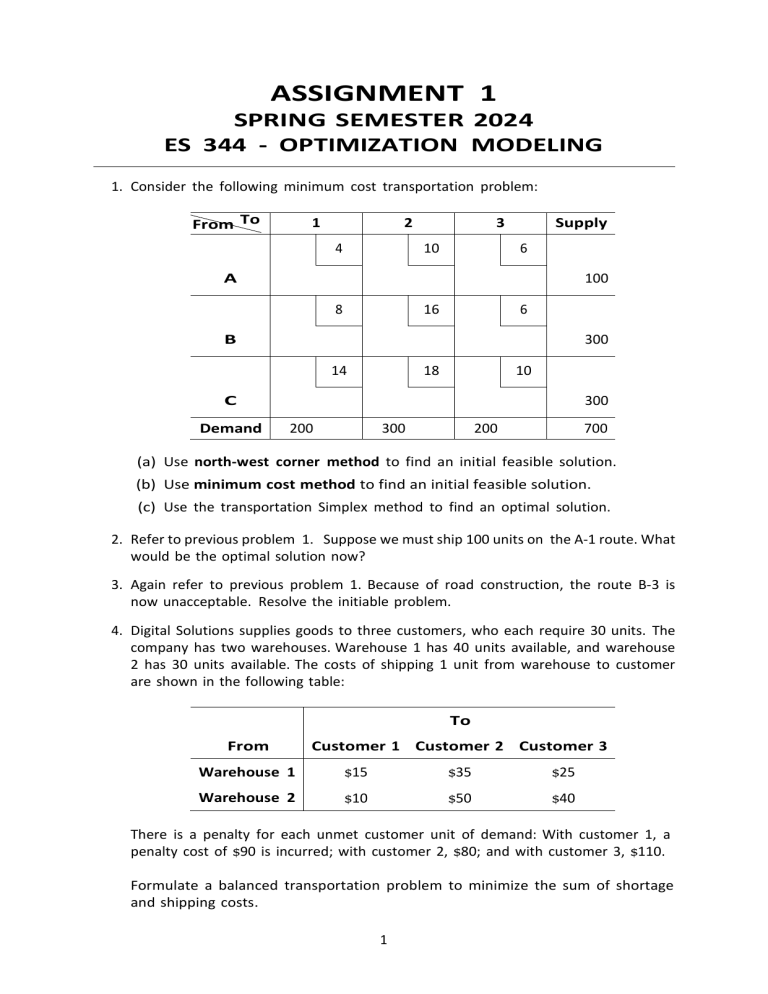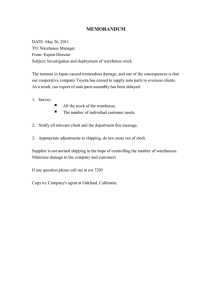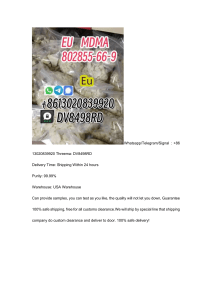
ASSIGNMENT 1 SPRING SEMESTER 2024 ES 344 - OPTIMIZATION MODELING 1. Consider the following minimum cost transportation problem: From To 1 2 4 3 10 Supply 6 A 100 8 16 6 B 300 14 18 10 C Demand 300 200 300 200 700 (a) Use north-west corner method to find an initial feasible solution. (b) Use minimum cost method to find an initial feasible solution. (c) Use the transportation Simplex method to find an optimal solution. 2. Refer to previous problem 1. Suppose we must ship 100 units on the A-1 route. What would be the optimal solution now? 3. Again refer to previous problem 1. Because of road construction, the route B-3 is now unacceptable. Resolve the initiable problem. 4. Digital Solutions supplies goods to three customers, who each require 30 units. The company has two warehouses. Warehouse 1 has 40 units available, and warehouse 2 has 30 units available. The costs of shipping 1 unit from warehouse to customer are shown in the following table: To From Customer 1 Customer 2 Customer 3 Warehouse 1 $15 $35 $25 Warehouse 2 $10 $50 $40 There is a penalty for each unmet customer unit of demand: With customer 1, a penalty cost of $90 is incurred; with customer 2, $80; and with customer 3, $110. Formulate a balanced transportation problem to minimize the sum of shortage and shipping costs. 1 5. Refer to previous problem 4. Use the transportation simplex algorithm to solve the problem. Interpret your answer. 6. Again refer to previous problem 4. Now suppose that extra units could be purchased and shipped to either warehouse for a total cost of $100 per unit and that all customer demand must be met. Formulate a balanced transportation problem to minimize the sum of purchasing and shipping costs. Use the transportation simplex algorithm to solve the problem. Interpret your answer. 7. Based on your solution of problems 4, 5 and 6, formulate the best policy for Digital Solutions to meet its customer demands. 8. The distribution system for the Herman Company consists of three plants, two warehouses, and four customers. Plant capacities and shipping costs per unit (in dollars) from each plant to each warehouse are as follows: Plant Warehouse 1 Warehouse 2 Capacity 1 4 7 450 2 8 5 600 3 5 6 380 Customer demand and shipping costs per unit (in dollars) from each warehouse to each customer are From Customer 1 Customer 2 Customer 3 Customer 4 Warehouse 1 6 4 8 4 Warehouse 2 3 6 7 7 Demand 300 300 300 400 The objective is to have an optimal shipping plan that will meet the demands at minimum cost. (a) Develop a network representation of this problem. (b) Formulate a linear programming model of the problem. (c) Develop a balanced transportation model (in tableau form) of this problem. (d) Solve the problem using Transportation Algorithm and interpret your solution. 9. Refer to previous problem 8. Now suppose that shipments between the two warehouses are permitted at $2 per unit and that direct shipments can be made from plant 3 to customer 4 at a cost of $7 per unit. How will you incorporate thesechanges in the above three models? 2

